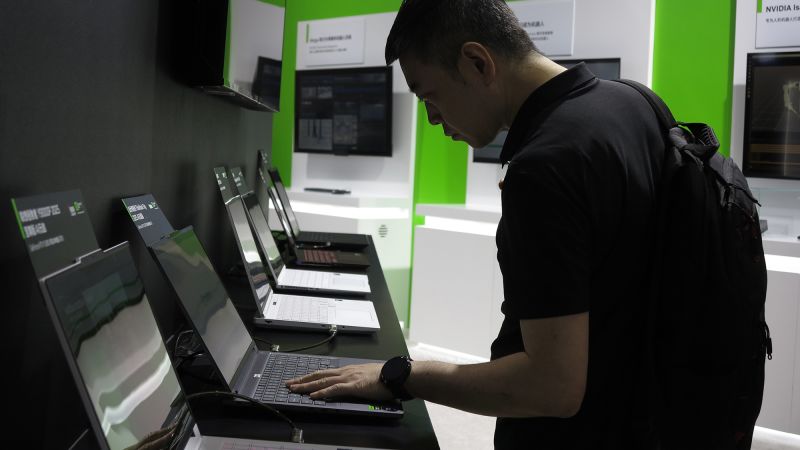The recent decision by former President Donald Trump, allowing Nvidia to renew sales of a crucial AI chip tailored for the Chinese market, marks a notable shift in U.S. technology policy towards China. This change comes after years of strict technology restrictions aimed at limiting China’s access to advanced semiconductor technologies. The chip in question, known as the H20, was originally banned in April 2023 amidst escalating trade tensions between the United States and China, making its approval a subject of intense interest and debate.
Despite the apparent opportunity presented by the easing of sales restrictions, China’s response to this policy reversal has been surprisingly muted. Over the past few weeks, Beijing has expressed skepticism regarding the H20 chip, labeling it a potential security risk and subsequently summoning Nvidia representatives for clarification. Furthermore, the Chinese government has cautioned its domestic companies against utilizing the H20, indicating that there may be broader, more strategic motivations at play.
These cautious reactions reflect China’s ambition to establish a self-reliant semiconductor supply chain. There’s a palpable confidence in the strides made by China’s domestic chip industry, which, while still reliant on American technology, has made significant progress in recent years. Xiang Ligang, the director-general of a technology industry group based in Beijing, commented on this advancement, stating that the notion of China’s technological incapacity is outdated and that the nation is prepared to thrive despite U.S. sanctions.
Moreover, even with enhancements in its semiconductor production capabilities, China remains in urgent need of American chip technology, especially the more sophisticated AI processors that are still under U.S. export controls. While companies like Huawei have made strides in chip performance, they still do not fully meet the capabilities offered by Nvidia’s advanced offerings. This duality of progress and dependency reflects the complexities of the current geopolitical landscape.
The decision to allow Nvidia to resume sales raises questions about the transactional nature of U.S. national security policies. Commerce Secretary Howard Lutnick articulated a perspective suggesting that U.S. firms should pursue market shares in China to ensure that Chinese developers become reliant on American technologies. This sentiment, however, has drawn scrutiny, with critics questioning the implications of leveraging technological partnerships for national security gains.
From a security perspective, China has evidenced heightened apprehension regarding Nvidia’s chip, especially relating to alleged capabilities for tracking and remote shutdown—speculations that the chipmaker has publicly refuted. In response to these fears, Chinese authorities have reinforced their stance against the H20, cautioning domestic firms against its usage.
Nvidia has positioned itself as a significant player within the global tech ecosystem, with its products integrated into a broader software environment that enhances their appeal. The firm’s CEO, Jensen Huang, emphasized the necessity of the U.S. maintaining its technological leadership by ensuring that its chips remain the standard across global markets. Conversely, this narrative masks the inherent challenges faced by China, such as the limitations on domestic chip production exacerbated by ongoing U.S. trade restrictions.
China’s struggling semiconductor industry continues to grapple with these complexities. Significant challenges remain, including reliance on foreign High Bandwidth Memory (HBM) technologies and the limitations in integrating advanced chip components. The export controls imposed by the U.S. have spurred urgency in China’s semiconductor development efforts, with expectations that domestic capacity for AI chips will drastically increase in the coming years.
Furthermore, analysts predict that domestic chip solutions will grow significantly within the Chinese market, potentially overtaking U.S. suppliers in a few years. The broader implications suggest that while the H20 remains attractive due to Nvidia’s established ecosystem, the long-term trajectory points toward increasing self-sufficiency within China’s semiconductor sector.
In summary, the debate surrounding the H20 chip sheds light on the intricacies of international relations in technology, the mutual dependencies of China and the U.S., and the ongoing race for technological supremacy. As both nations navigate this delicate balance, the pursuit of a self-sufficient semiconductor ecosystem in China will continue to be tested against the advancements and pressures invoked by American technology policies.












